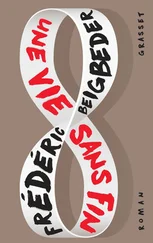In the meantime, it will be very strange for him to see Joss Dumoulin again after all this time. Joss Dumoulin, dubbed ‘the million dollar DJ’ in last month’s Vanity Fair : an old friend who hit the big time. Marc is unsure if he is really happy about the fact that Joss has become so famous. He feels like a sprinter still at the starting-blocks, watching his best mate ascend the podium to howls of adulation from the crowd.
In a nutshell, Joss Dumoulin is master of the universe, since he practises the most important profession in the world in the greatest city in the world: he is the best DJ in Tokyo.
Is it really necessary to remind you how the DJs seized power? In a hedonistic society as superficial as ours, the citizens of the world are interested in only one thing: partying. (Sex and money being implicitly part and parcel of the whole: money facilitates partying which facilitates sex.) And DJs have complete control. Not content just with clubs, they spawn the rave culture and have people dancing in warehouses, car parks, building sites, any available patch of waste ground. They are the ones who killed off rock and roll, inventing first rap and then house. They lord it over the Top 40 by day and the clubs by night. It’s getting hard to avoid them.
DJs remix our lives. Nobody gives them a hard time about it: if you’re going to hand over power to someone, a DJ is at least as qualified as a movie star or an ex-lawyer. After all, to govern, all you need is a good ear, a little general knowledge and the ability to segue.
Being a DJ is a curious profession. Somewhere between priest and prostitute. You give everything you have to people who give nothing in return. You spin discs so that other people can dance, have it large, come on to the pretty girl in the skin-tight dress. Then you head home on your own with your records under your arm. Being a DJ is a dilemma. A DJ exists only through other people: he steals other people’s music to get other people to dance. He’s a mix of Robin Hood (steals from one to give to the other) and Cyrano de Bergerac (living his life by proxy). All in all, the most important profession of our time is enough to drive anyone mad.
Joss Dumoulin didn’t squander his youth at the Institut d’Études Politiques like Marc. At twenty, he headed straight for Japan with nothing in his luggage except the three Bs of success: Bone Idleness, Bullshit Artistry and Bigging It Up. Why Japan? Because, he used to say, ‘If you’re going to take a gap year somewhere, you might as well head for the richest country on earth. It’s all about the Benjamins, baby.’
Of course, Joss’s gap year turned into a gap life. In no time flat he was the mascot of Nippon nightlife. His club nights at Juliana’s, it is said, were bangin’. It has to be said he arrived at just the right time: Tokyo was just discovering the delights of capitalist decadence. Government ministers were increasingly corrupt, foreigners increasingly numerous. Tokyo’s gilded youth was having a hard time spending all their parents’ money. All in all, Marc Marronnier took the wrong turn.
He went over for a visit once. He can confirm that Joss Dumoulin has only to walk into Gold and suddenly every guy in the place is snorting loudly or popping little bits of blotter. As for the girls, they turn themselves into geishas as he walks by. Marc has Polaroids in a drawer somewhere to prove it.
Joss Dumoulin has lived Marc Marronnier’s life for him. Pulled all the girls he doesn’t have the balls to talk to. Taken all the drugs he’s afraid to try. Joss is the polar opposite of Marc; maybe this is why they got on so well once upon a time.
Marc only drinks fizzy drinks: Coca-Cola in the morning, Berocca in the afternoon, vodka and tonic at night. He fills himself with bubbles all day long. As he puts down his glass of Alka-Seltzer (just this once), he thinks back to Tokyo bay and that fantastically Pacific ocean.
He remembers the night he spent at Love and Sex on the top floor of Gold where a dozen of Joss’s mates fucked some Chink girl as innocent as she was handcuffed. It was here, after he’d had his turn, that Marc was introduced to Joss’s wife. You learn something new every night.
Marc is horribly unlucky: his parents are in great shape. Every day, they fritter away a little more of his inheritance. Meanwhile, the Digital Sampler, a machine invented in the mid-eighties, has made Joss Dumoulin rich and famous. The sampler makes it possible to nick the best bits from any piece of music and recycle them to make ‘dance’ tracks. Thanks to this invention, DJs, who were previously little more than human jukeboxes, have become musicians in their own right. (It’s as if librarians were writing books or museum curators painting pictures.) Joss was quick on the uptake: suddenly, his productions flooded the Japanese club market and from there the world. All he need do is drag out whatever he likes from his record collection and serve it up to his nocturnal public. He watches their reactions, ditches anything that doesn’t make them dance, notes what works. He feels his way: there is no better focus group than a dance floor. This is how you become an inter-national star while your old friend goes on uselessly studying.
Commercial success wasn’t long in coming. It was Joss who first mixed birdsong with Mesopotamian choirs: the record was number one in thirty countries including Sri Lanka and the Commonwealth of Independent States. Then Joss launched bossa-soukouss over a melody stolen from the Goldberg Variations: a huge hit which made it onto the heavy rotation playlist of MTV Europe. Marc still laughs when he thinks about that summer when, thanks to Dumoulin’s bossa-soukouss video (sponsored by Orangina), everyone was doing the dance where you yank the girl’s breasts.
And so on and so on: Joss chalked up a fortune pretty quickly. Georges Guétary dressed in Jean-Paul Gaultier singing traditional Israeli chants? Joss produced that one: twenty-three weeks at number one in the French charts. Techno-gospel? Joss. That instrumental with Archie Shepp playing sax over a drum solo by Keith Moon (of course you remember – the one that made acid jazz seem gay)? That was Joss. The Sylvie Vartan–Johnny Rotten duet? Joss again. Right now (Marc read about it in the Vanity Fair article where Joss was photographed by Annie Leibovitz drowning in a sea of quarter-inch tape), he’s working on a mix featuring an Airbus A320 crashing and Petula Clark singing ‘Don’t Sleep in the Subway’, a garage version of the speeches of Maréchal Pétain and a one-off concert at Wembley Stadium featuring Luciano Pavarotti singing with AC/DC. He’s got his work cut out for him. His kleptomaniac imagination knows no bounds, to say nothing of his CD sales. Joss Dumoulin understands the age in which he lives: he only makes collages.
And here he is, Joss Dumoulin organising the grand opening of Shit, the club all of Paris has been waiting for. It’s hardly a revelation: Joss does one-nighters all over the world. And not just anywhere: at Club USA (New York), Pacha (Madrid), the Ministry of Sound (London), 90° (Berlin), the Baby’O (Acapulco), the Bash (Miami), the Roxy (Amsterdam), the Mau-Mau (Buenos Aires), Alien (Rome) and – obviously–Space (Ibiza). Different sets where the same people are squirming, depending on the season. Marc is a little bitter but decides to look on the bright side. After all, Joss will be able to introduce him to the prettiest girls at the gig. Or at least the one he doesn’t want for himself.
Marc has access to a network of informants: PR sluts and certified star-fuckers. They phone him to tell him that Shit really was built in an old public toilet. They’ve built a giant toilet on the place de la Madeleine. A six-feet-high pink bog roll serves as an awning above the entrance. But the main attraction, the thing that will completely revolutionise clubbing in Paris, is that they’ve built a submersible circular dance floor in the shape of a toilet seat, equipped with a giant flush mechanism which plunges the dancers into a huge whirlpool at some unspecified point during the evening. Marc also learns that, to maintain the element of surprise, the guests for the opening were deliberately not sent their invitations until the day of the opening, at the last possible minute. He thinks that most of the interesting people will somehow manage to wriggle out of their multiple prior engagements.
Читать дальше












